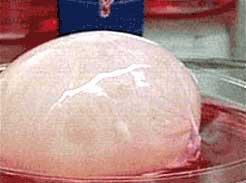 |
|
Lab-grown bladder (Photo: VNN) |
Scientists at Wake Forest University in North Carolina, USA, have successfully recreated a bladder by culturing bladder cells from patients in the lab for seven to eight weeks and then directly transplanting it into the patient.
The research team treated seven young patients suffering from congenital spina bifida, a condition that leads to bladder weakness.
They obtained a bladder biopsy from the patients. After that, they isolated muscle cells and specialized bladder cells known as urothelial cells and placed them on a bladder-shaped scaffold.
These cells were cultured in the laboratory for seven to eight weeks.
Using surgical methods, the researchers attached the lab-grown bladder to the patient’s existing bladder and monitored the development process for five years.
The results showed that bladder function improved without any adverse reactions.
The success of this research was published in The Lancet on April 4 and was hailed as a breakthrough in medicine towards the development of replacements for other damaged body parts.
Currently, using this method, scientists are proceeding with the transplantation of 20 different tissues from various organs in the laboratory, such as blood vessels and hearts.
Ngọc Huyền


















































